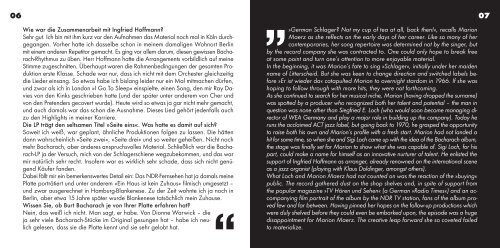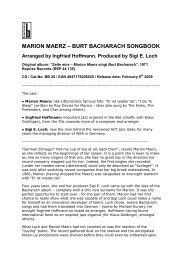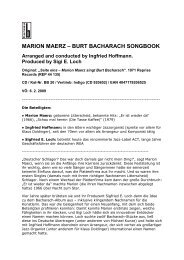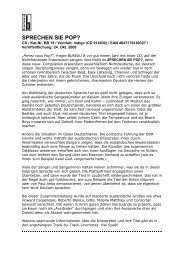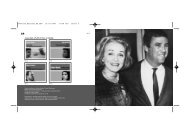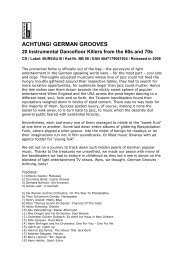Booklet - Grosse Freiheit
Booklet - Grosse Freiheit
Booklet - Grosse Freiheit
Sie wollen auch ein ePaper? Erhöhen Sie die Reichweite Ihrer Titel.
YUMPU macht aus Druck-PDFs automatisch weboptimierte ePaper, die Google liebt.
06<br />
Wie war die Zusammenarbeit mit Ingfried Hoffmann?<br />
Sehr gut. Ich bin mit ihm kurz vor den Aufnahmen das Material noch mal in Köln durchgegangen.<br />
Vorher hatte ich dasselbe schon in meinem damaligen Wohnort Berlin<br />
mit einem anderen Repetitor gemacht. Es ging vor allem darum, diesen gewissen Bacharach-Rhythmus<br />
zu üben. Herr Hoffmann hatte die Arrangements vorbildlich auf meine<br />
Stimme zugeschnitten. Überhaupt waren die Rahmenbedingungen der gesamten Produktion<br />
erste Klasse. Schade war nur, dass ich nicht mit dem Orchester gleichzeitig<br />
die Lieder einsang. So etwas habe ich bislang leider nur ein Mal mitmachen dürfen,<br />
und zwar als ich in London »I Go To Sleep« einspielte, einen Song, den mir Ray Davies<br />
von den Kinks geschrieben hatte (und der später unter anderem von Cher und<br />
von den Pretenders gecovert wurde). Heute wird so etwas ja gar nicht mehr gemacht,<br />
und auch damals war das schon die Ausnahme. Dieses Lied gehört jedenfalls auch<br />
zu den Highlights in meiner Karriere.<br />
Die LP trägt den seltsamen Titel »Seite eins«. Was hatte es damit auf sich?<br />
Soweit ich weiß, war geplant, ähnliche Produktionen folgen zu lassen. Die hätten<br />
dann wahrscheinlich »Seite zwei«, »Seite drei« und so weiter geheißen. Nicht noch<br />
mehr Bacharach, aber anderes anspruchsvolles Material. Schließlich war die Bacharach-LP<br />
ja der Versuch, mich von der Schlagerschiene wegzubekommen, und das war<br />
mir natürlich sehr recht. Insofern war es wirklich sehr schade, dass sich nicht genügend<br />
Käufer fanden.<br />
Dabei fällt mir ein bemerkenswertes Detail ein: Das NDR-Fernsehen hat ja damals meine<br />
Platte porträtiert und unter anderem »Ein Haus ist kein Zuhaus« filmisch umgesetzt –<br />
und zwar ausgerechnet in Hamburg-Blankenese. Zu der Zeit wohnte ich ja noch in<br />
Berlin, aber etwa 15 Jahre später wurde Blankenese tatsächlich mein Zuhause.<br />
Wissen Sie, ob Burt Bacharach je von Ihrer Platte erfahren hat?<br />
Nein, das weiß ich nicht. Man sagt, er habe. Von Dionne Warwick – die<br />
“<br />
ja sehr viele Bacharach-Stücke im Original gesungen hat – habe ich neulich<br />
gelesen, dass sie die Platte kennt und sie sehr gelobt hat.<br />
„<br />
07<br />
»German Schlager? Not my cup of tea at all, back then!«, recalls Marion<br />
Maerz as she reflects on the early days of her career. Like so many of her<br />
contemporaries, her song repertoire was determined not by the singer, but<br />
by the record company she was contracted to. One could only hope to break free<br />
at some point and turn one’s attention to more enjoyable material.<br />
In the beginning, it was Marion’s fate to sing »Schlager«, initially under her maiden<br />
name of Litterscheid. But she was keen to change direction and switched labels before<br />
»Er ist wieder da« catapulted Marion to overnight stardom in 1966. If she was<br />
hoping to follow through with more hits, they were not forthcoming.<br />
As she continued to search for her musical niche, Marion (having dropped the surname)<br />
was spotted by a producer who recognized both her talent and potential – the man in<br />
question was none other than Siegfried E. Loch (who would soon become managing director<br />
of WEA Germany and play a major role in building up the company). Today he<br />
runs the acclaimed ACT jazz label, but going back to 1970, he grasped the opportunity<br />
to raise both his own and Marion’s profile with a fresh start. Marion had not landed a<br />
hit for some time, so when she and Sigi Loch came up with the idea of the Bacharach album,<br />
the stage was finally set for Marion to show what she was capable of. Sigi Loch, for his<br />
part, could make a name for himself as an innovative nurturer of talent. He enlisted the<br />
support of Ingfried Hoffmann as arranger, already renowned on the international scene<br />
as a jazz organist (playing with Klaus Doldinger, amongst others).<br />
What Loch and Marion Maerz had not counted on was the reaction of the »buying«<br />
public. The record gathered dust on the shop shelves and, in spite of support from<br />
the popular magazine »TV Hören und Sehen« (a German »Radio Times«) and an accompanying<br />
film portrait of the album by the NDR TV station, fans of the album proved<br />
few and far between. Having pinned her hopes on the follow-up productions which<br />
were duly shelved before they could even be embarked upon, the episode was a huge<br />
disappointment for Marion Maerz. The creative leap forward she so coveted failed<br />
to materialize.


